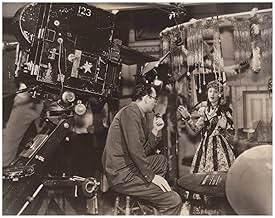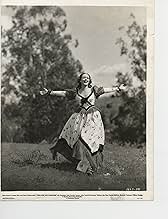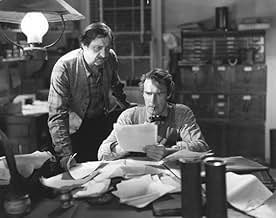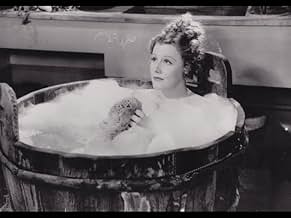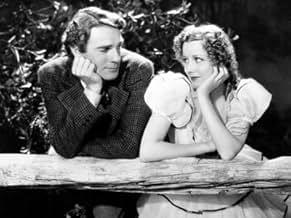Pennsylvania, 1859. Railroad tycoon Brennan (Alan Hale) is muscling in on oil-drilling farmers, led by Peter Cortland (Randolph Scott). Cortland must try to save their oil business, while al... Read allPennsylvania, 1859. Railroad tycoon Brennan (Alan Hale) is muscling in on oil-drilling farmers, led by Peter Cortland (Randolph Scott). Cortland must try to save their oil business, while also saving his marriage to Sally (Irene Dunne).Pennsylvania, 1859. Railroad tycoon Brennan (Alan Hale) is muscling in on oil-drilling farmers, led by Peter Cortland (Randolph Scott). Cortland must try to save their oil business, while also saving his marriage to Sally (Irene Dunne).
- Director
- Writers
- Stars
- Student
- (uncredited)
- Director
- Writers
- All cast & crew
- Production, box office & more at IMDbPro
Featured reviews
Paramount obviously had high hopes for this movie, assigning Rouben Mamoulian to direct and cinematographers Vic Milner and Theodore Sparkuhl to supervise the cameras. The cast is likewise excellent: Dorothy Lamour, Raymond Walburn, William Frawley, Charles Bickford, and Akim Tamiroff are just two of the actors adding their talents to the spectacle.
Unhappily, the score is not among the best of the Hammerstein-Kern efforts. Other reviewers have expressed their admiration for Miss Dunne's rendition of the sentimental "The Folks Who Live on the Hill." I prefer Frawley's "Will You Marry Me Tomorrow, Maria?", but there isn't much to it, and and old-fashioned orchestration -- suitable for the 1860 setting -- makes the songs unmemorable.
What's left is the "little guys against greedy capitalists", and there are some beautifully shot sequences, especially when the circus (complete with elephants) comes to the rescue of the men building the pipeline. Yet while the camerawork makes the movie always engaging, the tired story and bad score limit it to that.
The story is an unusual one because it's about the nation's first oil wells which were created in Western Pennsylvania in 1859. It begins just before this and a medicine show arrives in town. After a freak fire breaks out and leaves the show stranded, some of the locals take in the medicine show folk. One of them is Sally (Irene Dunne) and soon she is in love with the son of the old lady who took her into her home. As for Peter (Randolph Scott), he looks like a perfect catch for Sally...but little does she know that he's about to strike oil and the oil business would dominate their marrage and sour it as well.
In many ways, this reminded me of the later MGM film "Boom Town", as it's also about the oil business as well as its negative impact on a new marriage. Both are worth seeing, but I'd prefer "Boom Town" simply because it lacks the pointless songs of "High, Wide and Handsome"....none of which are memorable and just seem unnecessary.
Overall, worth seeing IF you don't mind the songs. The finale is pretty neat and the acting quite good.
The rest of the movie is really good, so I'm glad I gave it another chance! No one knows exactly why Randolph Scott left traditional Hollywood and did westerns with his own production company, but when you see him in the 1930s, you'll see him giving his heart to different performances. Although his westerns were very popular, my heart aches that he wasn't given the A-tier Hollywood movies. He could have easily stepped into Shane, High Noon, or any John Wayne flick. He had the talent, the looks, and the onscreen energy to take Hollywood by storm. But I've never seen him exercise his acting chops more than in this movie. In one passionate speech, he's actually moved to tears in order to inspire the workmen to finish the job. He's romantic, determined, and ambitious, convinced that there's oil in the hills. No matter what anyone says, he continues to drill - and one day, it all pays off. But Irene loves him for the country bumpkin he used to be; will everything change when they're rich?
This movie didn't need to be a musical, especially since Irene Dunne only sings a few songs that don't really matter to the storyline. Scottie McScottie Pants never sings, but he does get to gaze adoringly at her as she serenades him. They have such fantastic chemistry together in this movie (and a steamy bedroom kissing scene) it makes you wonder if the sparks flew off the screen, too. With the love shining from his eyes, his blonde curls, and his strong muscles as he drills for oil, you almost forget anyone else is in the movie. But there is Irene Dunne, who loves him above all else, and you'll also see Dorothy Lamour briefly, and a young, brown-haired Charles Bickford!
Did you know
- TriviaAccording to Margaret J. Bailey's book on Hollywood costume design of the 1930's, "Those Glorious Glamour Years," apple trees in blossom were required for some scenes. Frost in California had decimated the apple trees, so studio technicians at Paramount Studios worked overnight, peeling rosebuds down and sticking them on bare trees with maple syrup to simulate an apple orchard in full blossom.
- Quotes
Mac: I'll bet Sally will be glad to get away from here.
Doc Watterson: You think so, Mac?
Mac: Sure. She's always fightin' with that Cortlandt fella. She hates the sight of him.
Doc Watterson: You know human nature, don't you Mac?
Mac: From A to Z.
Doc Watterson: You must have skipped W. The women come under W.
- How long is High, Wide and Handsome?Powered by Alexa
Details
- Release date
- Country of origin
- Language
- Also known as
- Jerome Kern and Oscar Hammerstein's High, Wide and Handsome
- Filming locations
- Production company
- See more company credits at IMDbPro
Box office
- Budget
- $1,900,000 (estimated)
- Runtime
- 1h 50m(110 min)
- Color
- Aspect ratio
- 1.37 : 1

